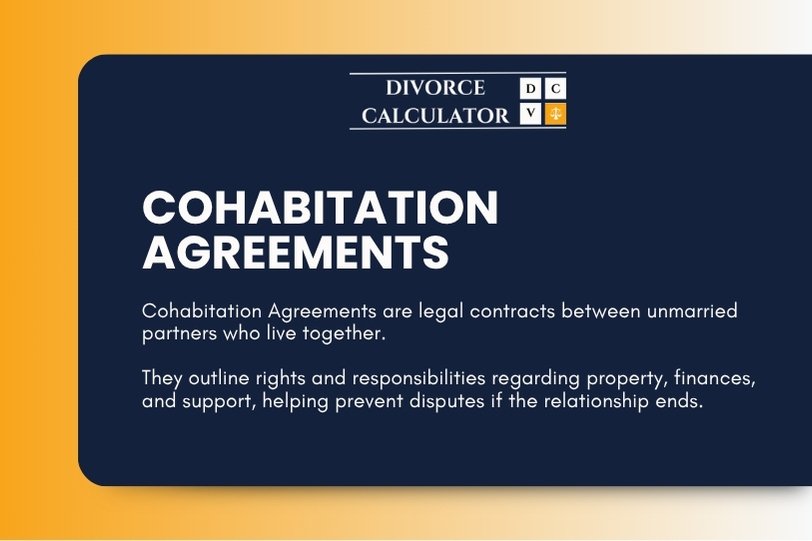When living together without getting married, it’s important for us to understand our legal rights and responsibilities. A cohabitation agreement helps us clearly define how we’ll share property, handle finances, and address what happens if our relationship ends.
By having these arrangements in writing, we can avoid misunderstandings and protect both our interests. Without a cohabitation agreement, we risk leaving crucial decisions up to default laws that may not reflect our wishes.
Taking time to create a cohabitation agreement isn’t just for those with significant assets; it provides clarity and peace of mind for any couple who chooses to live together.
Key Takeaways
A cohabitation agreement sets clear financial and legal expectations for couples who live together but are not married. These agreements can help us avoid misunderstandings about property, debts, and living arrangements.
Key points to remember:
- Cohabitation agreements are legally binding in most states, but enforceability can vary.
- We can specify how to divide assets, manage joint expenses, and handle property if we separate.
- The agreement allows us to address issues like support payments, debt responsibility, and ownership of shared purchases.
Our needs and circumstances change over time. It’s important to review and revise a cohabitation agreement if our situation changes, such as a major purchase or the birth of a child.
Typical topics covered include:
| Topic | Examples |
|---|---|
| Property ownership | Home, car, furniture |
| Finances | Bank accounts, bill payments |
| Debts | Loans, credit cards |
| Support obligations | Monthly payments, emergency funds |
Before signing, we should each get independent legal advice. This helps ensure the agreement is fair and meets legal requirements.
Cohabitation agreements offer us a practical way to protect both parties’ interests and set out our expectations clearly.

Why It Matters In Divorce
Cohabitation agreements can have a direct impact on how assets are divided if we go through a divorce. Having clear terms helps both parties know their rights and responsibilities from the start.
When we outline property, finances, and living arrangements in a cohabitation agreement, it reduces confusion during separation. This clarity can save us both time and legal costs.
Key Benefits:
- Asset protection: The agreement specifies what belongs to each person.
- Debt division: We state who is responsible for which debts.
- Financial support: It may cover arrangements for spousal support.
If we do not have such an agreement, courts may decide property division using state laws. This outcome may not match our original intentions.
Having written expectations also helps us avoid misunderstandings. It supports a smoother process and can prevent disputes.
| Topic | Without Agreement | With Agreement |
|---|---|---|
| Asset Division | Court decides | As agreed by us |
| Debt Responsibility | Unclear assignments | Clearly detailed |
| Legal Costs | Often higher | Can be lower |
By addressing these points in advance, a cohabitation agreement provides predictability in case of separation. It is a useful tool for protecting our interests and making divorce proceedings less complicated.
Real-Life Examples
In our experience, many couples use cohabitation agreements to clarify how shared expenses are handled. For example, one couple in their thirties set terms for splitting rent and utilities, helping to prevent future conflicts over money.
We often see partners protecting personal property. A recent case involved two individuals who outlined which assets would remain separate, such as inherited items and business interests. This ensured both parties understood their rights if the relationship ended.
Cohabitation agreements can also aid in managing debt. One couple agreed that any pre-existing student loans would remain the sole responsibility of the person who incurred them, reducing anxiety over financial obligations.
Below is a simple table summarizing common uses:
| Situation | How Agreement Helped |
|---|---|
| Shared Apartment | Clarified rent contributions |
| Personal Assets | Defined ownership |
| Existing Debt | Protected one partner |
By outlining these arrangements, we notice relationships become more transparent. Written agreements reduce misunderstandings and set clear expectations moving forward.
How States Handle Cohabitation Agreements
State law determines how cohabitation agreements are recognized, enforced, and challenged. Local statutes and court decisions set specific requirements and limitations that affect both the drafting and enforceability of these agreements.
New York
In New York, cohabitation agreements are generally valid if both parties enter into the arrangement voluntarily and with full knowledge of each other’s finances. Courts often treat these contracts like other civil agreements, provided there is no consideration based solely on sexual services, which is prohibited.
We must ensure that each party has independent legal counsel for these agreements to hold more weight in court. The agreement should be in writing and signed by both partners. New York courts enforce provisions about property distribution and financial support but may not enforce clauses that resemble terms of marriage, like spousal support, unless both parties clearly intend those outcomes.
Certain matters, such as child custody or child support, cannot be definitively determined by a cohabitation agreement in this state. These issues are always subject to judicial review based on the best interests of the child.
California
California tends to recognize cohabitation agreements, provided they meet the standard contract requirements of offer, acceptance, and consideration. The state distinguishes between so-called “Marvin agreements” (named after a famous court case) and traditional contracts.
Marvin agreements let us arrange property and financial matters without implying any marital rights. However, these agreements must be clear and specific. They cannot contradict laws related to marriage, domestic partnership, or violate public policy.
Any provisions dealing with waiving support or discussing how assets will be divided upon separation should be unambiguous. California insists these agreements be written and signed by both parties, although oral contracts have sometimes been enforced under limited circumstances. Matters regarding children—support and custody—remain outside the binding language of a cohabitation agreement and are overseen by a court.
Texas
Texas law treats cohabitation agreements much like other contracts, but the state does not recognize common law marriage unless specific statutory requirements are met. In our agreements, we must be explicit in stating property and financial arrangements. Oral agreements are risky and difficult to enforce, so written contracts are the standard.
Texas courts will uphold valid agreements as long as they are free of fraud, duress, or undue influence, and the terms are not unconscionable. The state does not allow us to include terms that are dependent only on sexual relationships.
We cannot override parental duties by agreement, so any issues related to children will be reviewed separately by the courts. Having both parties review the agreement with legal counsel is strongly recommended to reinforce its enforceability.
Florida
Florida permits cohabitation agreements, but only if they meet formal contract rules. These contracts must be in writing, signed by both parties, and have clear consideration other than sexual services. Florida law specifically prohibits agreements based primarily on “meretricious” relationships.
Property division and support arrangements may be enforced if the agreements are explicit and voluntary. We must be clear that neither party is relying on rights found in marriage law because Florida courts do not extend marital status or privileges by contract.
Any terms related to parenting or child support are not binding, as the interests of the child always supersede private agreements. The involvement of legal professionals for drafting and review is highly recommended to avoid challenges based on fraud or ambiguity.
Tips If You’re Dealing With Cohabitation Agreements
Before drafting or signing a cohabitation agreement, we should openly discuss our expectations, finances, and future plans. This helps prevent misunderstandings.
It’s a good idea for us to make a list of shared and individual assets. Clear documentation can make it easier to define what belongs to each person.
We may want to consult a legal professional familiar with local laws on cohabitation. Legal advice ensures our agreement is both fair and enforceable.
Using plain and direct language in our agreement avoids confusion down the line. If we’re unsure about any wording, we can ask for clarification or adjustments.
Here’s a simple checklist we can use:
- Outline how expenses will be shared.
- Specify property and asset details.
- Determine arrangements if the relationship ends.
- Address debts and financial obligations.
We must keep signed copies of the agreement in a safe place, accessible to both of us. It’s important that each person has their own copy.
If our circumstances change—such as getting married, having children, or acquiring significant assets—we should review and update our agreement together. This keeps everything relevant and effective.
Frequently Asked Questions
We often encounter legal and practical questions regarding cohabitation agreements, especially about their enforceability, impact on property, and relationship status. Addressing specific concerns helps us make more informed decisions and protect our interests.
Are cohabitation agreements legally binding?
In many jurisdictions, cohabitation agreements are legally binding if both parties sign the agreement voluntarily and it is fair, clear, and not made under duress. We must ensure that each party receives independent legal advice and the terms are specific to increase the likelihood that a court will uphold the agreement.
What should be included in a cohabitation property agreement?
A cohabitation property agreement should clearly outline which assets belong to each partner both before and during the relationship. We should include provisions about property ownership, contributions to household expenses, responsibility for debts, and division of property if the relationship ends.
How does cohabitation affect the legal status of a relationship compared to marriage?
Cohabitating partners do not receive the same legal rights and protections as married couples. We should remember that, unless a legal agreement is in place, shared property and financial responsibilities may not be treated in the same way as in a marriage.
What are the common reasons couples might opt for a cohabitation agreement?
Many of us choose cohabitation agreements to clarify financial arrangements, establish property rights, or protect individual assets. They can also help prevent conflicts and uncertainty if there is a separation.
Can a cohabitation agreement protect my assets in the event of separation?
A well-drafted cohabitation agreement can specify how our assets will be divided if we separate. This can provide clarity and reduce the risk of disputes over property, savings, or other financial interests.
How does the two-year cohabitation rule impact legal rights and obligations?
Some jurisdictions, such as certain Canadian provinces, have a two-year cohabitation rule that may grant partners certain rights after living together for that period. We should check local laws to see how long-term cohabitation could affect our rights to shared assets, benefits, or support.



